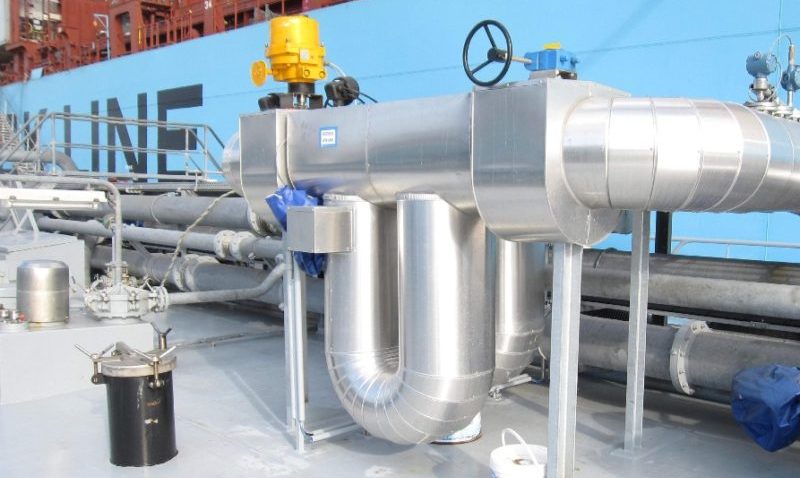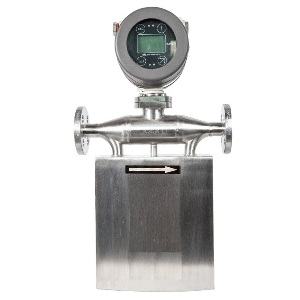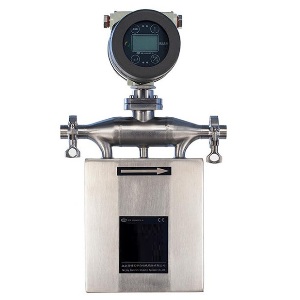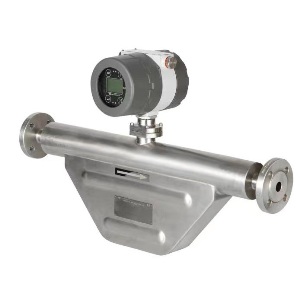A Coriolis flow meter is a type of flow meter used to measure the mass flow rate or volume flow rate of liquids and gases in pipelines. It uses the Coriolis effect, which causes a vibration in a tube through which the liquid or gas is flowing. The frequency of this vibration is proportional to the mass flow rate of the fluid, allowing for accurate measurement of flow rate.
Coriolis flow meters are widely used to measure the mass flow rate of various fluids such as liquids, gases, and slurries. These flow meters are accurate, reliable, and provide highly precise measurements. The fluid flowing through the meter is forced to move in a curved path due to Coriolis forces acting on it. This results in a measurable deflection that can be used to determine the flow rate. In this article, we will review the top 10 Coriolis flow meters available in the market.
1, Coriolis Mass Flow Meter
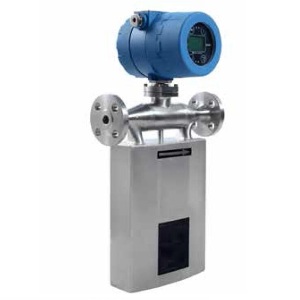
The U-shaped tube designed Coriolis mass flow meter has been available in the measurement market for over 30 years, offering excellent and stable performance. Its nominal diameters range from DN3 (1/8″) to DN250 (10 inches) and it is highly versatile, capable of measuring various complex media including paint, ultra-low temperature nitrogen, syrup, palm oil, mud, liquid ammonia, slurry, high viscosity materials, greases, and more. It can even measure the flow of challenging substances such as Dichlorosilicon dihydrogen, Trichlorosilane, Silicon tetrachloride, and SiHCl3 among others. As we approach the year 2023, there is a growing demand for this classic Coriolis flow meter due to its exceptional functionality.
2, Asphalt /bitumen flow meter
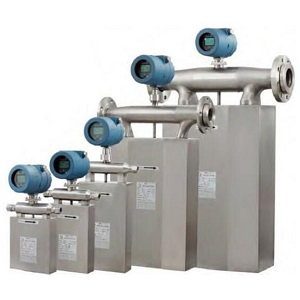
A pipeline liquid asphalt pipeline usually operates at 200° C (392°F) due to its high viscosity and poor fluidity. Despite the high temperature of bitumen, the viscosity remains high, and a small amount of solid particulate impurities can be found in the medium. Bitumen flow measurement is difficult with conventional liquid flow meters. The Coriolis flow meter is a perfect choice for measuring asphalt or bitumen flow in-line.
3, Small Coriolis flow meter/flow controller
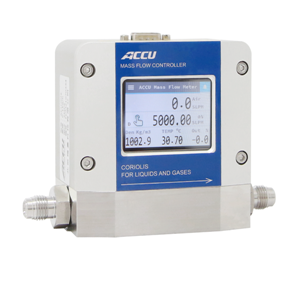
Coriolis flow meters can be used to measure large quantities of flow, such as 50 Mt/h, 100 Mt/h, or even higher, with conventional flow meters. Coriolis flow technology has been successfully applied to very low flow measurements, such as 40g/h, 10 kg/h, etc. SH-CMF-FE combines PID controllers and batch functions into the system so as to achieve ultra low flow control or low flow quantities feeding, and it is the P&ID mass flow meter.
4, Refrigerant Flow Meter
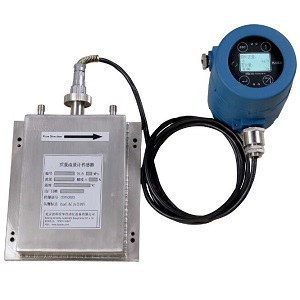
A Refrigerant Flow Meter is an instrument that is used to measure the flow rate of refrigerant in a cooling system. It can accurately measure the quantity of refrigerant flowing in the unit, and ensure that the system is operating efficiently and optimally. There are different types of refrigerant flow meters such as Coriolis, Thermal Mass, and Vortex flow meters, among others, which use various principles to measure the flow rate of refrigerant. The measurements provided by a refrigerant flow meter are essential in maintaining the performance of the HVAC (heating, ventilation, and air conditioning) system and prevent costly damage to the equipment.
5, CNG mass flow meter
The high accuracy and reliability of coriolis flow meters make them commonly used to measure compressed natural gas (CNG). CNG is used in vehicles and requires accurate measurement for billing and custody transfers. Besides measuring mass flow accurately, CNG Coriolis flow meters can also withstand high pressures of CNG, such as 3600 PSI, also measuring dirty CNG and liquid and gas mix fluids.
6, Sanitary and hygienic Coriolis flow meter
A Sanitary and Hygienic Coriolis flow meter is a type of Coriolis mass flow meter specifically designed for use in hygienic applications. It is commonly used in the food, pharmaceutical, and biotech industries to measure the flow rate of liquids and gases accurately while maintaining sanitary conditions.
The design of these meters features smooth, polished surfaces without any crevices, which make it easy to clean and remove any bacteria build-up that could contaminate the process. They are also equipped with special seals and gaskets to prevent any leaks or contamination during operation.
These meters are ideal for use in sterile environments where product purity and safety are essential. They can handle a wide range of flow rates, from low to high, and can precisely measure the density and viscosity of liquids. Additionally, they are highly accurate, reliable, and require minimal maintenance.
7, High pressure Coriolis mass flow meter
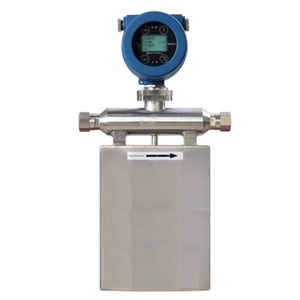
A High pressure Coriolis mass flow meter is a type of Coriolis flow meter designed to handle high-pressure fluids. It is commonly used in processes that require precise and accurate measurement of fluids at elevated pressures, typically above 1000 psi.
These meters are designed to withstand the high-pressure environments encountered in many industrial applications, including oil and gas production, chemical processing, and aerospace engineering. They use advanced materials and construction techniques to ensure durability and long-term reliability under extreme conditions.
High-pressure Coriolis mass flow meters rely on the Coriolis effect to measure the mass flow rate of fluids as they pass through a vibrating tube. They are highly accurate, delivering precise measurements even at high pressures and flow rates. Additionally, they can offer other process measurement parameters such as pressure, temperature, density, and viscosity.
8, Bent tube Coriolis flow meter
A Bent tube Coriolis flow meter is a type of Coriolis flow meter that uses a U-shaped or bent tube to measure the mass flow rate of fluids. The fluid flows through the tube, which vibrates at its natural frequency, causing the tube to twist and bend in response to the Coriolis forces generated by the fluid motion.
The degree of tube twisting and bending is proportional to the mass flow rate of the fluid, allowing the meter to determine the flow rate by measuring the phase shift between the inlet and outlet sensors mounted on either side of the tube.
Bent tube Coriolis flow meters are known for their high accuracy and wide range of applications. They can handle both high and low viscosity fluids as well as aggressive and abrasive fluids. They are commonly used in process industries such as oil and gas, chemical processing, food and beverage, pharmaceuticals, and water treatment.
A significant benefit of Bent tube Coriolis flow meters is their ability to measure both mass flow rate and density simultaneously, thereby eliminating the need for separate density measurements. This makes them a popular choice among industries where measuring density is also important alongside mass flow measurement.
9, High Viscosity Fluid Flow Meters
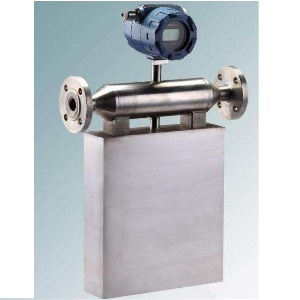
High viscosity Coriolis flow meters are designed specifically for measuring the flow rate and mass of high viscosity fluids, such as crude oil, molasses, honey, resin, glue, paint, bitumen, etc. It is difficult for flow meters to measure these fluids due to their high viscosity, which can result in flow disturbances and pressure drops, which can impact flow accuracy. Due to their unique operating principle for viscous liquids, Coriolis flow meters can handle fluids with viscosities up to 200000 cp.
10, Fuel Oil Mass Flow Meter
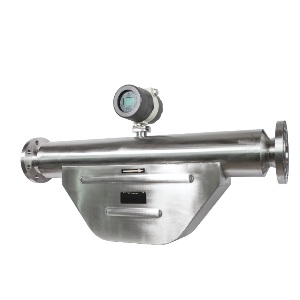
A Fuel Oil Mass Flow Meter is a device that is specifically designed to measure the mass flow rate of fuel oil in various industrial applications. This type of flow meter operates on the principle of Coriolis force, which means it measures the mass flow by detecting the twisting or bending of the flow element caused by the fluid’s inertia.
The Fuel Oil Mass Flow Meter can accurately measure the mass flow rate and density of fuel oil continuously and in real-time. The measurement data obtained by the meter is used for process control, billing, custody transfer, and other related purposes.
Fuel Oil Mass Flow Meters are used in many industrial applications, including marine, oil & gas, power generation, and petrochemicals. These meters can handle different types of fluids, including viscous fluids like fuel oil. They can provide accurate flow rate measurements even under harsh environmental and operational conditions.
Some of the benefits of using Fuel Oil Mass Flow Meters include high accuracy, low maintenance, reliable performance, and easy installation. With these features, Fuel Oil Mass Flow Meters are an ideal choice for applications where accurate and continuous flow rate measurement is essential.





